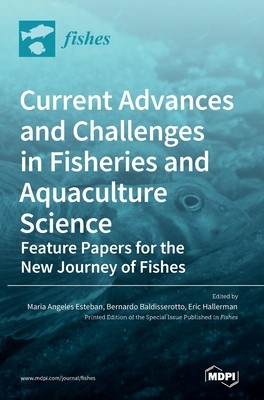
- We will send in 10–14 business days.
- Publisher: MDPI AG
- ISBN-10: 303654075X
- ISBN-13: 9783036540757
- Format: 17 x 24.4 x 1.6 cm, hardcover
- Language: English
- SAVE -10% with code: EXTRA
Current Advances and Challenges in Fisheries and Aquaculture Science (e-book) (used book) | bookbook.eu
Reviews
Description
This addresses current advances and challenges in fisheries and aquaculture science. Exposure of larval fish to elevated temperatures during embryological development may induce craniofacial and morphological alterations, which are suggested possible impacts of global warming. Molecular markers shed new light on the ontogenetic migration of stream fishes. Fast growth rates, early age at maturity, moderate fecundity, and diverse diet explain the potential for introduced fishes to dominate fish communities in their native and introduced range. Taking videos of marine benthic habitats supports low-impact, real-time monitoring of species occurrence. Among heavily fished species, almost half had outdated demographic assessments that would benefit from the integration of data from fisheries sources and improved collaboration among fishery stakeholders and managers. The continued growth of aquaculture will depend upon developing feeds that improve the growth, oxidative status, and immune response of fed cultured organisms. New aquaculture feedstuffs might be derived from plants or microbes, and new additives would include ghrelins and dietary symbiotics. The effects of these constituents on survival, growth, gut histomorphology, immune response were assessed for cultured freshwater and marine species. The results provide suggestions for advances in aquafeeds for the species studied and for cultured fishes more generally. The scientific advances realized with the use of new tools provide the basis for addressing global challenges to fisheries, aquaculture and for ongoing scientific research.
EXTRA 10 % discount with code: EXTRA
The promotion ends in 9d.16:45:29
The discount code is valid when purchasing from 10 €. Discounts do not stack.
- Publisher: MDPI AG
- ISBN-10: 303654075X
- ISBN-13: 9783036540757
- Format: 17 x 24.4 x 1.6 cm, hardcover
- Language: English English
This addresses current advances and challenges in fisheries and aquaculture science. Exposure of larval fish to elevated temperatures during embryological development may induce craniofacial and morphological alterations, which are suggested possible impacts of global warming. Molecular markers shed new light on the ontogenetic migration of stream fishes. Fast growth rates, early age at maturity, moderate fecundity, and diverse diet explain the potential for introduced fishes to dominate fish communities in their native and introduced range. Taking videos of marine benthic habitats supports low-impact, real-time monitoring of species occurrence. Among heavily fished species, almost half had outdated demographic assessments that would benefit from the integration of data from fisheries sources and improved collaboration among fishery stakeholders and managers. The continued growth of aquaculture will depend upon developing feeds that improve the growth, oxidative status, and immune response of fed cultured organisms. New aquaculture feedstuffs might be derived from plants or microbes, and new additives would include ghrelins and dietary symbiotics. The effects of these constituents on survival, growth, gut histomorphology, immune response were assessed for cultured freshwater and marine species. The results provide suggestions for advances in aquafeeds for the species studied and for cultured fishes more generally. The scientific advances realized with the use of new tools provide the basis for addressing global challenges to fisheries, aquaculture and for ongoing scientific research.


Reviews